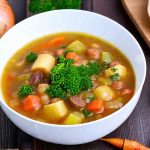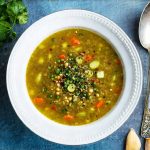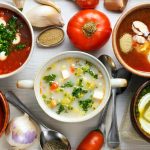The human digestive system is a remarkably resilient but also surprisingly delicate machine. Modern diets, often characterized by processed foods, low fiber intake, and inadequate hydration, can place significant stress on this system, leading to discomfort, bloating, and even long-term health issues. Many people struggle with digestion without realizing the simple dietary adjustments that could make a profound difference. Often overlooked is the power of incorporating more liquid-based meals – specifically soups and stews – into our regular eating patterns. These aren’t just comfort foods; they represent an easily accessible pathway to improved digestive health and overall wellbeing, offering benefits ranging from gentle hydration to nutrient bioavailability. If you are prone to nausea after eating, consider how to structure meals for better digestion.
The appeal of soup and stew goes beyond mere taste or nostalgia. They offer a unique textural experience that’s often easier for the body to process than solid foods, reducing the workload on the stomach and intestines. This is particularly beneficial for individuals with sensitive digestive systems, those recovering from illness, or anyone simply looking to optimize their gut health. Beyond digestibility, the inherent moisture content of these dishes contributes significantly to hydration levels – something many of us chronically underestimate in our daily routines. Effectively, a well-crafted soup or stew isn’t just food; it’s a holistic approach to nourishing both body and mind. Maintaining adequate hydration strategies is also key.
The Digestive Benefits of Liquid Meals
Soups and stews offer a distinct advantage when it comes to digestive ease due to their inherently softer texture and higher water content. Unlike dense, solid foods that require significant chewing and enzymatic breakdown, the pre-softened ingredients in liquid meals bypass many of these initial stages, lessening strain on the digestive system. This is especially helpful for individuals with conditions like dyspepsia (indigestion) or those who have difficulty chewing due to dental issues or age. The gentle nature of these meals allows the stomach to more easily process food and move it along the digestive tract.
The liquid component also plays a crucial role in softening stool, preventing constipation, and promoting regularity. Fiber, when combined with adequate hydration – which soups and stews naturally provide – functions optimally, adding bulk to the stool and facilitating smooth bowel movements. The increased fluid intake supports overall digestive function by keeping the intestinal walls lubricated and allowing for easier passage of waste. Furthermore, a hydrated digestive system is more efficient at absorbing nutrients from food, maximizing the nutritional benefits of each meal. Consider neutral-temperature meals to further aid digestion.
It’s important to note that the ingredients used in soups and stews significantly impact their digestibility. Choosing easily digestible vegetables like carrots, zucchini, and spinach, along with lean proteins and whole grains, will further enhance these benefits. Avoiding excessive amounts of fat or highly processed ingredients is also key to creating a truly gut-friendly meal.
Optimizing Soup & Stew Ingredients for Digestion
The foundation of a digestive-friendly soup or stew lies in careful ingredient selection. While the possibilities are endless, focusing on whole, unprocessed foods will yield the greatest benefits. Here’s how to build a recipe with digestion in mind:
- Prioritize Easily Digestible Vegetables: Root vegetables like carrots and sweet potatoes offer gentle fiber and essential nutrients. Zucchini, spinach, and kale (cooked until tender) are also excellent choices. Avoid cruciferous vegetables like broccoli or cauliflower if you experience bloating, or cook them thoroughly to reduce their gas-producing potential.
- Lean Proteins Are Key: Opt for lean proteins such as chicken breast, turkey, fish, or plant-based alternatives like lentils and beans (soaked overnight to improve digestibility). Limit red meat, which can be more difficult to digest.
-
Whole Grains Add Bulk & Fiber: Incorporate whole grains like barley, quinoa, or brown rice to provide sustained energy and fiber. Remember that adequate hydration is crucial for fiber to function properly.
-
Consider using bone broth as a base for your soups – it contains collagen and amino acids which may support gut health (though more research is needed).
- Avoid excessive spices or highly processed ingredients, which can irritate the digestive system.
- Slow cooking methods are beneficial; they break down food further, making it easier to digest. Taking space between tasks and meals can also aid digestion.
The Role of Hydration in Digestive Health
Hydration isn’t merely about quenching thirst; it’s fundamentally linked to optimal digestive function. Water is essential for breaking down food, absorbing nutrients, and moving waste through the digestive tract. Dehydration can lead to constipation, bloating, indigestion, and a host of other digestive issues. Soups and stews are naturally hydrating due to their high water content – often exceeding 80% water by volume.
This makes them an excellent alternative to drinking plain water, particularly for individuals who struggle to meet their daily hydration goals. The combination of fluid and nutrients in a soup or stew also enhances absorption, allowing the body to utilize both more effectively. It’s not just about the amount of liquid consumed but also its context; a flavorful and nourishing soup is often easier to consume in larger quantities than plain water, promoting better overall hydration. You can also scan and test options for liver-related digestion problems if needed.
Beyond Digestion: Nutrient Bioavailability & Overall Wellness
The benefits of soup and stew extend beyond improved digestion and hydration. The cooking process itself can enhance nutrient bioavailability – the extent to which nutrients are absorbed by the body. For example, cooking tomatoes increases the availability of lycopene, a powerful antioxidant. Similarly, gentle simmering breaks down cell walls in vegetables, making their vitamins and minerals more accessible.
Furthermore, soups and stews often encourage mindful eating habits. The slower pace associated with enjoying a warm bowl of soup allows you to savor each bite, promoting better satiety and reducing the likelihood of overeating. This can contribute to weight management and overall wellbeing. The combination of nutrient-rich ingredients, enhanced bioavailability, and mindful eating makes soups and stews a powerful tool for supporting holistic health. They are not simply food but an investment in your long-term vitality. Don’t forget about kitchen swaps to further improve digestion!


















